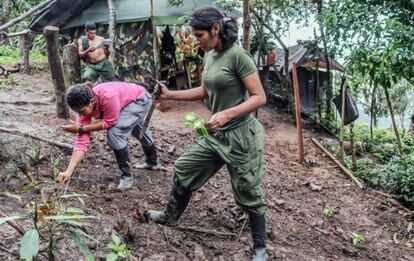Colombia approves amnesty for FARC combatants
Move will benefit estimated 5,000 former guerrillas, many in jail for political crimes

Colombia’s Congress on Wednesday took a major step forward in the country’s peace process when it approved an amnesty for former combatants of the Revolutionary Armed Forces of Colombia (FARC). The new law provides legal guarantees for around 5,000 ex-fighters from the guerrilla group, who will now move to holding areas from where they will start to make the transition to civilian life.

According to Voces de Paz (Voices of peace), a newly created association that aims to facilitate the FARC’s transition to non-violence and participation in mainstream political life, the amnesty also directly affects around 1,000 people serving sentences for political and related crimes, who will now be conditionally released from jail.
The government of President Juan Manuel Santos says that by January 30 it will announce how many FARC members have not been included in the amnesty, i.e. those who will effectively be sent into internal exile rather than jailed. The Justice Ministry says that while it has no exact figures yet on the measures, it estimates there are at least 4,000 FARC members in jail.
We hope the doors of the jails will open so those involved in the insurgency can leave Francisco Toloza, Voces de paz
Interior Minister Juan Fernando Cristo told journalists that there are different types of amnesty. “There will be an automatic amnesty for FARC members accused of political crimes such as rebellion,” he said, which will affect the majority of the organization’s foot soldiers.
Cases involving FARC members who have been found guilty of drug trafficking or other crimes will be assessed by a special court that has yet to be convened.
The government has pointed out that although state officials can apply for amnesty under the new law, it will not apply to people found guilty of war crimes. Nor will there be amnesty for members of the armed forces: “In those cases, prison terms will not be imposed for minor offenses,” said Cristo.
He warned that beneficiaries of the amnesty were required by law to cooperate with the specially commissioned peace tribunal and to take part in victim reparation programs.
There will be no amnesty for members of the armed forces, and will not apply to not apply to people found guilty of war crimes
The amnesty law was questioned by former president Álvaro Uribe and his Democratic Center party, which abstained in the vote. It was also criticized by José Miguel Vivanco, the director of Human Rights Watch Americas, who said there was a risk some wrongdoers may escape justice.
“We are worried that some areas of the project may limit the possibility of judging abuses,” wrote Vivanco in a letter to President Santos.
Rodrigo Londoño, the leader of the FARC, called on members of Congress to respect the conditions of the revised peace deal signed with the government on November 24 and to implement it “speedily.”
Some 78 members of the FARC have been given presidential pardons over the last year, but Wednesday’s amnesty law is aimed at bringing about a return to political normality as quickly as possible.
“We hope that the doors of the jails will open so that those involved in the insurgency can leave, as well as the hundreds of community leaders who were also found guilty of rebellion,” said Francisco Toloza of Voces de paz, which has been monitoring the debates in Congress.
The amnesty law is the first to be approved as part of a fast-track mechanism introduced to speed up the process of implementing the peace deal, first signed in September, after four years of negotiations in Cuba.
English version by Nick Lyne.
Tu suscripción se está usando en otro dispositivo
¿Quieres añadir otro usuario a tu suscripción?
Si continúas leyendo en este dispositivo, no se podrá leer en el otro.
FlechaTu suscripción se está usando en otro dispositivo y solo puedes acceder a EL PAÍS desde un dispositivo a la vez.
Si quieres compartir tu cuenta, cambia tu suscripción a la modalidad Premium, así podrás añadir otro usuario. Cada uno accederá con su propia cuenta de email, lo que os permitirá personalizar vuestra experiencia en EL PAÍS.
¿Tienes una suscripción de empresa? Accede aquí para contratar más cuentas.
En el caso de no saber quién está usando tu cuenta, te recomendamos cambiar tu contraseña aquí.
Si decides continuar compartiendo tu cuenta, este mensaje se mostrará en tu dispositivo y en el de la otra persona que está usando tu cuenta de forma indefinida, afectando a tu experiencia de lectura. Puedes consultar aquí los términos y condiciones de la suscripción digital.








































